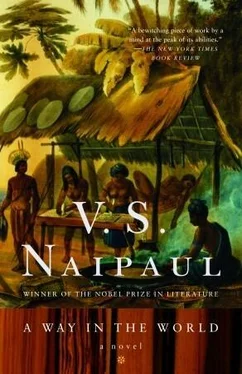He said, “I hope I not coming back to big news.” He struck his heart heavily with his braceleted right hand. “I can’t tell you how much I feel that I am going to pay now for all my luck here.”
Closer and closer below us now the windy grey and white sea, the blocks of flats, the long runways of the airport in the narrow strip of flat land between the sea and the mountains, the scarred red earth, the scores of yellow earth-removing machines, the many small white aeroplanes of the internal Venezuelan airlines, Aeropostal, Avensa, the larger jets of half a dozen international airlines beside the long terminal building: Venezuela of the boom, where in Caracas (reached by long tunnels through those mountains) in the more luxurious commercial centres a shirt could cost a hundred dollars, at a time when in New York a fifty-dollar shirt was an extravagance.
We stood in different immigration queues. As a Venezuelan he was quickly through. He waited for me, noticeable with his pigtail and his souvenir raffia bag.
The immigration official, when I got to him, waved my disembarkation form at me. He was about to say something when a colleague called to him; he called back, absently wrote something on my form, stamped it, stamped my passport, waved me on, and left his desk.
Manuel Sorzano lifted his chin and asked, “What he write on your paper?”
I looked. I had not written what my occupation was — and this was only partly an oversight: at that time writers were suspect: some guerrillas had been misusing the word. In the blank for occupation, the distracted official had written “Ejecutivo,” executive.
Manuel Sorzano said, “You see why this is a great country? They treat you according to what you show yourself to be. They respect you just as much as you respect yourself. Nowhere else.”
A man of the Guardia was looking at us. Manuel Sorzano had noticed, and he had very slightly adjusted his demeanour to show that he was on both sides of authority: a friendly acknowledgement of the uniform, together with a slight rounding of the shoulder to show deference to it.
In the customs hall he said, “But you should be a little careful. We have a few guerrillas here. Two or three times Antonio get involved in a little gunplay with them. One fellow write on his ID card Director Ejecutivo , Chief Executive. Boasting, nuh. Word get around, and one bright morning the guerrillas drive up and snatch him just as he was getting in a bus to go to work. A colectivo , one of those little private buses where you have to stoop. Everybody so busy scrambling on and minding their head, nobody notice. When they find he have no big company behind him, to pay up, they shoot him. In this country you have to know how to handle yourself.”
8. In the Gulf of Desolation: An Unwritten Story
AT ONE time I thought I should try to do a play or a film — a film would have been better — about the Gulf. I saw it as a three-part work: Columbus in 1498, Raleigh in 1618, and Francisco Miranda, the Venezuelan revolutionary, in 1806: three obsessed men, well past their prime, each with his own vision of the New World, each at what should have been a moment of fulfilment, but really near the end of things, in the Gulf of Desolation. Separate stories, different people, changing style of clothes, but the episodes would have developed one out of the other, as in a serial.
Raleigh in 1618, an old, sick man, waiting in the Gulf for news of the gold mines which he had never seen and which he no longer believed in, was like Columbus in 1498, complaining in his journal about his bad eyesight and bad health and bad luck, pleading in advance for the sympathy of his sovereigns. As he picked his way along the indentations of this strange Gulf, partly salt, partly fresh, he saw himself sailing between the island he called The Trinity and another island (really the South American continent) which he called the Land of Grace. He was offering place-names as prayers, and exaggerating the wonder of what he saw. He had already almost lost his dream of the New World; he knew that things had gone very wrong with the little Spanish colony he had left behind on the island of Haiti. And at the end of this third journey he was to go back in chains to Spain. Just as Raleigh in 1618, when there was no longer anything to wait for, went back to the Tower and execution.
There is this kind of madness and self-deception — followed by surrender — in the later career of Francisco Miranda, the Venezuelan revolutionary who came before Bolívar. Miranda is not as well known as Columbus or Raleigh. His career is just as fabulous and original, but (for a reason we will come to later) he has no historical myth, and it is necessary at this point to establish his story.
In 1806 Miranda is fifty-six. He has been out of Venezuela for thirty-five years. For more than twenty of those years, in the United States, England and France, he has been touting around an idea of Spanish-American liberation. Technically, he is a deserter from the Spanish army. This means he has been cut off from such family wealth as he has in Venezuela; and he has been living on his wits. The South American revolution — and his potential place at the head of it — is his only asset. In 1805 he panics; he feels that the French under Napoleon might invade the South American continent and that there might be no revolution for him to lead. He leaves England and goes to the United States. With money from a merchant (who is willing to speculate in the revolution) Miranda buys a small ship, recruits two hundred mercenaries, and decides to invade South America.
It is a long, slow journey south. He quarrels with the captain, he quarrels with his recruits, and the invasion is a disaster. In a simple forty-minute action a Spanish ship cuts off and detains the two unarmed schooners that are being used to land fifty-eight of the invaders. Miranda, who has last seen action twenty-five years before, turns and flees in his own ship.
He is succoured by the British authorities in Barbados and Trinidad. His unpaid, mutinous American recruits are brought to heel; he recruits more men from among the French in Trinidad; and he starts on a fresh invasion. Like Columbus, like Raleigh, he has a sense of history. He issues a proclamation: “The Gulf that Columbus discovered and honoured with his presence will now witness the illustrious action of our gallant efforts.”
His proclamations are of another sort when, with covert British naval help this time, he lands without opposition in Venezuela. Local officials who do not give up their allegiance to the Spanish authorities, he says, will be treated as enemies. His idea of revolution is as simple as that. No one comes over to him; people run away from him.
He makes no effort to ransom or to rescue or to bargain for the fifty-eight men he had lost earlier. Ten of them are hanged and quartered, their heads spiked, their remains ceremonially burnt. The others are all shut up in dreadful prisons. Miranda never talks about them or expresses sorrow for them. They were mercenaries, gamblers. If the invasion had come off, they would have had a lot of loot. As it is, they lost; nothing is owed them.
He isn’t strong enough — or skilled enough or confident enough — to move inland. After ten days he re-embarks. For some weeks he waits indecisively off the Venezuelan coast. British naval support, never officially authorized, is finally withdrawn; and there is nothing for Miranda to do but return to Trinidad.
For a whole year after this Miranda stays in Trinidad, and he is like a man marooned.
Until nine years before Trinidad was part of Venezuela and the Spanish empire. Now it is a British territory. Most of the island is forest, but it is empty forest: the aboriginal population has almost ceased to exist. Twenty years before, on the site of the old Indian shore settlement of Cumucurapo, the Spaniards had laid out a small Spanish-style town of regularly intersecting straight streets. Most of the residential plots away from the main square are empty and overgrown. Right at the end of the unfinished town, and going back to the hills and the forest on three sides, are the new slave plantations — newer than the town — set up on land that had remained bush for two hundred years, after the disappearance of the aboriginal people.
Читать дальше












